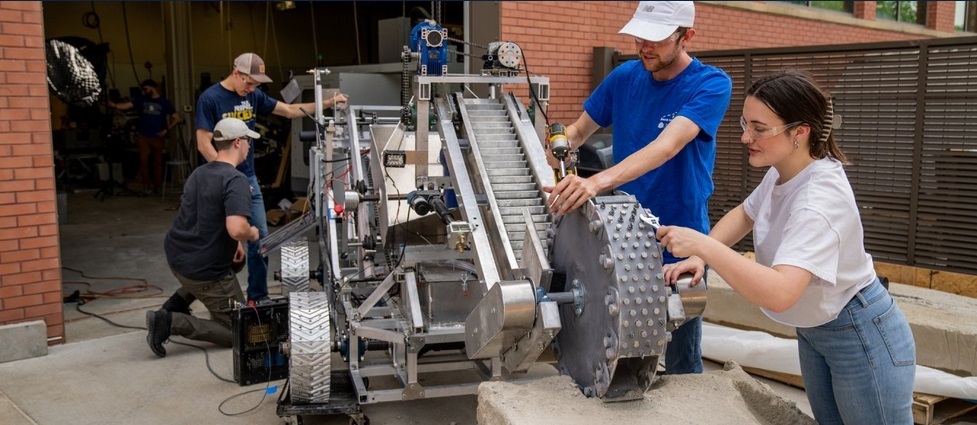| |
| |
Feb 10, 2026
|
|
|
|
|
2023-2024 Undergraduate Catalog [Archived Catalog]
Mechanical Engineering (B.S.) - Aerospace Engineering Specialization
|
|
 Return to: Academic Programs - Majors, Minors, Certificates Return to: Academic Programs - Majors, Minors, Certificates

 
.png)
Program Coordinator/Contact
Jeffrey Doom, Associate Professor
Department of Mechanical Engineering
Crothers Engineering Hall 220, Box 2219
605-688-6703
Program Information
Mechanical engineers design devices and systems that efficiently employ the materials and forces of nature for the benefit of society. Mechanical Engineering is an applied science profession based on mathematics, physics and chemistry. Expertise and sound judgment in application of the sciences are gained through a combination of study and practice.
Aerospace engineering is the primary field of engineering concerned with design and development of aircraft and spacecraft. Applications include traditional piloted fixed-wing and rotary-wing aircraft, as well as autonomous aircraft of various types. Satellites and other spacecraft are also among the applications of this field. Graduates in the Aerospace Engineering Specialization will be prepared to work in design of aircraft, spacecraft, propulsion systems and related components.
Accreditation, Certification, and Licensure
The Mechanical Engineering (B.S.) program at SDSU is accredited by the Engineering Accreditation Commission of ABET, https://www.abet.org.
Upon reaching the final semester of the curriculum, Mechanical Engineering students are eligible and required to sit for the Fundamentals of Engineering (FE) Exam. This nationally administered exam is the first step in the process of becoming licensed to practice as a Professional Engineer. Each state sets its own standards for licensing. In South Dakota, after successfully completing a B.S. degree from an accredited program and passing the FE Exam, four years of engineering experience under a licensed engineer are required to be eligible to sit for the Principles and Practices of Engineering Exam. Successfully passing this exam is the final step in becoming licensed as a Professional Engineer. Information can be found at http://www.ncees.org/.
Course Delivery Format
Mechanical engineering is an occupation requiring both study and practice. Instruction occurs through a combination of traditional classroom methods, laboratory exercises using contemporary engineering technologies, and design project experiences.
|
Program Educational Objectives
The Mechanical Engineering program provides a learning environment that prepares graduates to achieve the following career and professional accomplishments: - Achieve positions of increasing responsibility or leadership with employers, professional organizations, or civic organizations in recognition of professional competence and the ability to function in team environments.
- Complete licensure, certification, short courses, workshops or advanced degrees in technical or professional subject areas as they adapt to contemporary engineering practice and the global business environment.
Student Outcomes
Upon completing the Mechanical Engineering program, the student outcomes are: - an ability to identify, formulate, and solve complex engineering problems by applying principles of engineering, science, and mathematics.
- the ability to apply engineering design to produce solutions that meet specified needs with consideration of public health, safety, and welfare, as well as global, cultural, social, environmental, and economic factors.
- an ability to communicate effectively with a range of audiences.
- an ability to recognize ethical and professional responsibilities in engineering situations and make informed judgments, which must consider the impact of engineering solutions in global, economic, environmental, and social contexts.
- an ability to function effectively on a team whose members together provide leadership, create a collaborative and inclusive environment, establish goals, plan tasks, and meet objectives.
- an ability to develop and conduct appropriate experimentation, analyze and interpret data, and use engineering judgment to draw conclusions.
- an ability to acquire and apply new knowledge as needed, using appropriate learning strategies.
Academic Requirements
- A combined average of “C” or better in the mechanical engineering courses.
- A combined average of “C” or better in the mathematics courses.
- A minimum grade of “C” in each of the following courses: MATH 123, MATH 125, PHYS 211, ME 311, ME 312, and all EM designated courses
- Students who fail to earn a “C” or better in any of these courses, will be required to repeat them in each subsequent semester until the requirement is met.
Requirements for Mechanical Engineering Major - Aerospace Engineering Specialization: 130 Credits
Bachelor of Science System General Education Requirements
Select from the following
Select nine credits from the following. Credits: 9 Total Required Credits: 130
Summary of Program Requirements
Bachelor of Science | | | System General Education Requirements* | 33 Credit Hours | | Major Requirements | 54 Credit Hours | | Supporting Coursework | 43 Credit Hours | | Electives** | 0 Credit Hours | *System General Education Requirements for students pursuing a baccalaureate degree shall include a minimum of 30 credit hours. Some general education coursework may be counted for Major Requirements and Supporting Coursework.
**Taken as needed to complete any additional degree requirements. Academic Advising Guide Sheet
The goal of the academic advising guide sheets and sample plans of study is to promote undergraduate student success by guiding all students to timely completion of an undergraduate degree. Students are not limited to the course sequence provided for their academic program. Instead, the sample plan of study is one possible path to completing your degree and is meant to be used as a guide for planning purposes in consultation with an academic advisor. The plans also help students prepare for meetings with their academic advisor and track their progress in their selected academic program. |
 Return to: Academic Programs - Majors, Minors, Certificates Return to: Academic Programs - Majors, Minors, Certificates
|
|
|